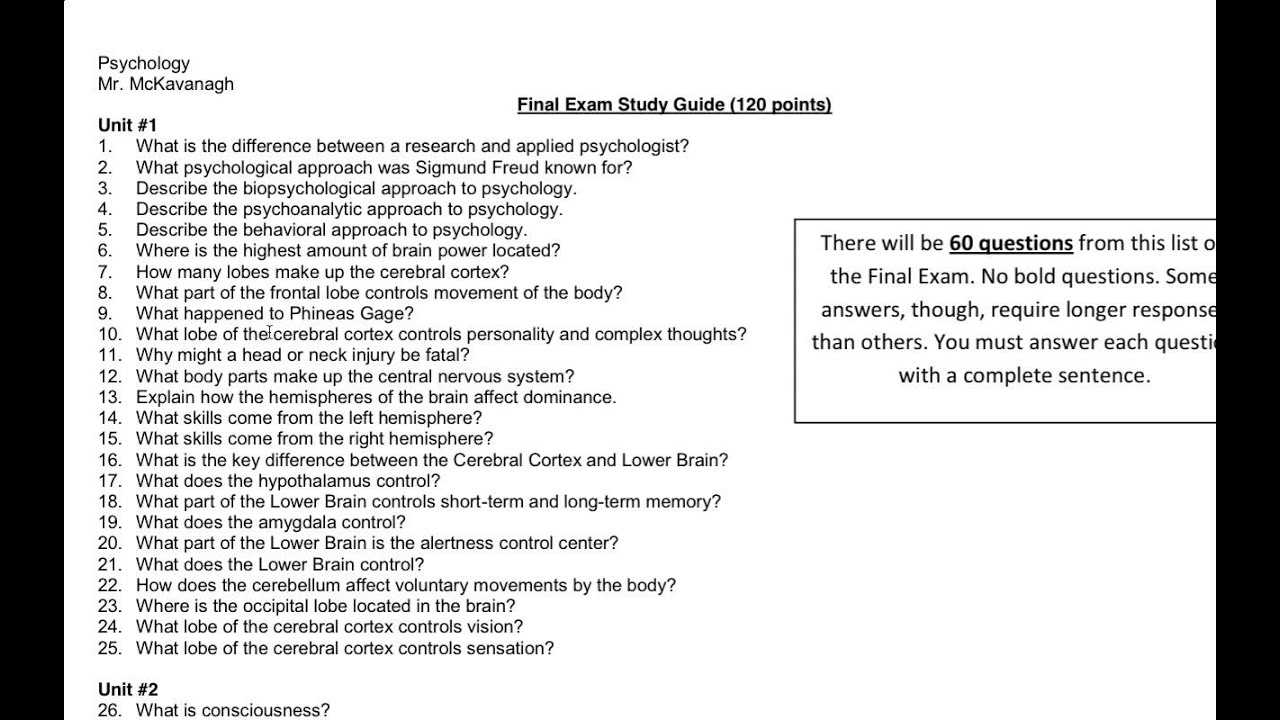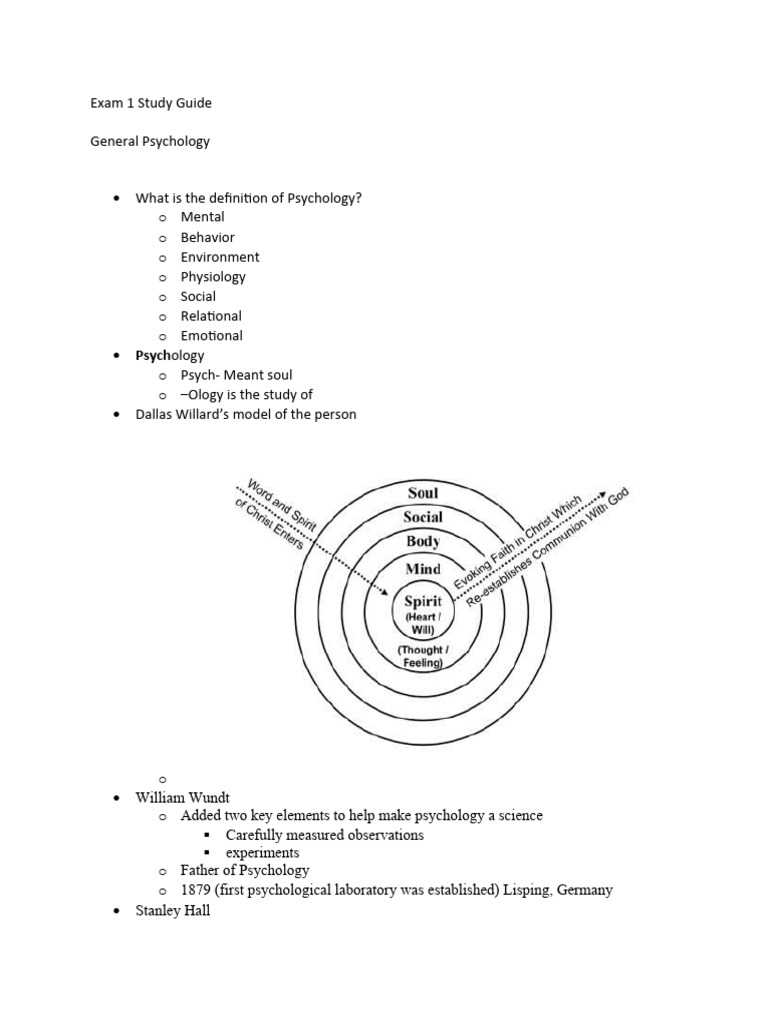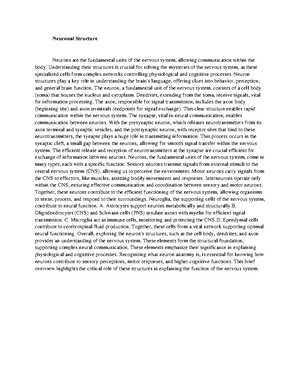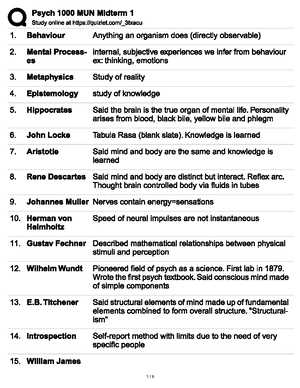
Preparing for an assessment in this field can be a daunting task, especially when so much information needs to be absorbed. The best approach is to break down complex ideas into manageable chunks and focus on the core principles. By organizing your review, you can enhance retention and improve your performance when faced with the questions ahead.
Understanding the foundational theories, key figures, and various schools of thought will give you a comprehensive view of the subject. Paying attention to practical applications and real-world connections will make it easier to recall important details during the evaluation. The ability to critically analyze the material and relate it to everyday life is crucial for success.
Effective preparation is not just about memorizing facts. It’s about grasping the underlying ideas and recognizing how they interconnect. With the right approach, you can feel confident and ready for any challenge that comes your way.
Preparation for the Upcoming Assessment
To excel in your upcoming evaluation, it is crucial to focus on the most important topics that will be covered. This includes grasping the key concepts, understanding the major theories, and connecting the dots between different ideas. A solid grasp of these areas will not only improve your chances of success but also help you feel more confident going into the test.
Start by reviewing essential areas that are likely to appear on the test. Organizing the material into clear categories will make the process less overwhelming. Below is a table summarizing the main topics to focus on, along with the corresponding areas that should be prioritized for each.
| Topic | Key Areas to Focus On |
|---|---|
| Theories and Models | Major psychological approaches, key figures, and core concepts |
| Behavior and Learning | Classical and operant conditioning, cognitive learning theories |
| Social and Cultural Influences | Group behavior, social influence, cross-cultural differences |
| Biological Foundations | Brain structure, neurotransmitters, nervous system functions |
| Personality Theories | Psychodynamic, humanistic, and trait theories |
| Disorders and Treatments | Major psychological disorders, therapy methods, and ethical considerations |
| Research Methods | Types of studies, data collection, and statistical analysis |
By focusing on these critical areas, you can streamline your preparation and ensure that you are well-equipped for the upcoming challenge. Remember to test yourself regularly, apply active recall techniques, and connect new information with what you already know for better retention.
Overview of Key Concepts
In preparation for your upcoming assessment, it’s essential to familiarize yourself with the core principles that form the foundation of the subject. Understanding these key ideas will allow you to build a strong base, ensuring that you can relate more complex material back to these essential concepts. Focus on the most fundamental areas that are likely to appear across various sections of the test.
Here are some of the main themes that you should focus on:
- Major Theories: Gain a thorough understanding of the primary models and frameworks that have shaped the field.
- Learning Processes: Pay attention to both classic and modern learning theories, and how they influence behavior.
- Human Development: Understand the stages of growth and the various factors that affect development throughout life.
- Brain Functionality: Explore the neural systems, how they impact behavior, and the biological basis for various psychological phenomena.
- Personality Traits: Study the various approaches to personality and how individual differences are explained.
- Abnormal Behavior: Identify key disorders and their diagnostic criteria, as well as treatment methods used to address them.
- Social Dynamics: Analyze how group behavior, social influence, and cultural factors shape individual actions.
By mastering these key concepts, you will create a strong foundation to build on as you dive deeper into more detailed material. Keeping these main points in mind will help you organize your review process effectively and efficiently.
Understanding Psychological Theories
To effectively navigate through the subject, it’s crucial to grasp the key theories that have shaped the understanding of human behavior. These frameworks offer valuable insights into how people think, act, and interact with the world. Each theory presents a unique perspective, and understanding them will allow you to connect various concepts and apply them to different scenarios.
Major Approaches in the Field
Several foundational models provide different explanations for behavior and mental processes. Some of the most influential ones include:
- Behaviorism: Focuses on observable behaviors and the effects of environmental stimuli.
- Cognitive Theory: Examines mental processes such as perception, memory, and decision-making.
- Humanistic Approach: Emphasizes individual growth, self-actualization, and the importance of personal experiences.
- Psychodynamic Theory: Focuses on unconscious processes and early life experiences in shaping behavior.
- Biological Perspective: Examines how the brain, genetics, and physiology influence thoughts and actions.
Applying Theories to Real-World Situations
Understanding these theories not only enhances your knowledge but also enables you to see how they apply to real-life scenarios. Whether examining behavior patterns, mental health disorders, or everyday decision-making, these theories provide valuable tools for interpreting the complexity of human actions.
Review of Research Methods
In any field of study, understanding how knowledge is gathered and tested is fundamental. Research methods provide the tools necessary for gathering data, testing hypotheses, and drawing conclusions about human behavior. A solid grasp of these techniques allows you to critically evaluate findings and apply them in a meaningful way.
Types of Research Approaches
There are various approaches used in gathering and analyzing information. The most common methods include:
- Experimental Research: Involves manipulating variables to determine cause-and-effect relationships.
- Correlational Studies: Examines the relationship between two variables without manipulating them.
- Survey Research: Gathers information through questionnaires or interviews to explore opinions and behaviors.
- Case Studies: Focuses on a detailed analysis of a single individual or a small group.
- Observational Research: Involves observing subjects in natural settings without interference.
Ethical Considerations in Research
Ethical guidelines are critical when conducting research, ensuring the well-being and rights of participants are upheld. Key ethical principles include:
- Informed Consent: Participants must be fully aware of the nature of the study and voluntarily agree to take part.
- Confidentiality: Personal information and data must be kept private and secure.
- Minimizing Harm: Researchers must avoid causing physical or psychological harm to participants.
By understanding these methodologies and ethical principles, you will be better equipped to interpret research findings and recognize the strengths and limitations of various approaches.
Famous Psychologists and Their Contributions

Throughout history, several key figures have significantly shaped the field through their groundbreaking theories and research. Their work has not only expanded our understanding of human behavior but also influenced many other disciplines. By exploring the contributions of these influential thinkers, we can appreciate the foundations of current practices and research in the field.
Key Figures in the Field
Some psychologists are widely recognized for their innovative ideas and the lasting impact they have had on the discipline. A few notable figures include:
- Sigmund Freud: Known for developing the theory of the unconscious mind and his work on psychoanalysis, Freud emphasized the importance of early childhood experiences in shaping personality.
- William James: Often referred to as the father of American psychology, James contributed to the development of functionalism, focusing on how mental processes help individuals adapt to their environment.
- Ivan Pavlov: Famous for his research on classical conditioning, Pavlov’s work on learned behaviors through association laid the foundation for much of modern behaviorism.
- Jean Piaget: Piaget’s theory of cognitive development revolutionized our understanding of how children think, focusing on stages of intellectual growth and their implications for learning.
- Abraham Maslow: Known for his hierarchy of needs, Maslow explored human motivation and self-actualization, emphasizing the importance of fulfilling basic needs before reaching higher psychological goals.
The Lasting Impact of Their Work
The theories and findings of these influential individuals continue to be taught and referenced today. Their contributions have shaped not only the study of behavior and mental processes but also influenced education, therapy, and even social policy. Understanding their work provides insight into the development of modern thought and its applications across various fields.
Memory and Learning in Psychology

Understanding how we acquire, store, and retrieve information is crucial to comprehending human behavior. Memory and learning are intricately linked processes that influence our ability to interact with the world around us. By examining the mechanisms behind these cognitive functions, we gain insight into how individuals adapt, remember, and process experiences over time.
Memory refers to the system by which we encode, store, and retrieve information, while learning describes how we acquire new knowledge or skills. Together, these processes form the foundation of human experience and are central to most psychological theories and practices.
The table below highlights key aspects of memory and learning, outlining the different stages and types involved in each process:
| Memory Process | Key Characteristics |
|---|---|
| Encoding | The initial stage of memory where information is processed and converted into a form that can be stored in the brain. |
| Storage | The maintenance of information over time, which can be short-term or long-term, depending on the significance and repetition of the data. |
| Retrieval | The process of recalling stored information, which can be influenced by various factors like context, emotion, and practice. |
| Types of Memory | Includes sensory memory, short-term memory, and long-term memory, each playing a distinct role in information processing. |
Learning can be broken down into different types, including classical conditioning, operant conditioning, and observational learning. Each method describes a different way in which behavior is acquired and shaped through experience.
By studying these processes, we can better understand how individuals develop skills, retain knowledge, and adjust to new situations. Mastery of these cognitive functions is key to personal growth and adaptability in everyday life.
Psychological Disorders and Treatments
Understanding mental health challenges and the available methods for addressing them is a crucial aspect of this field. Psychological conditions vary greatly in terms of severity and impact, ranging from temporary issues to long-term, debilitating disorders. This section explores the common disorders that individuals may experience and the different treatment approaches used to help manage or alleviate symptoms.
Common Psychological Disorders
There are a variety of mental health conditions that affect individuals in different ways. Some of the most widely recognized disorders include:
- Anxiety Disorders: Characterized by persistent feelings of fear or worry that interfere with daily activities.
- Depressive Disorders: Marked by prolonged feelings of sadness, hopelessness, and a lack of interest in previously enjoyed activities.
- Obsessive-Compulsive Disorder (OCD): Involves unwanted repetitive thoughts and behaviors that individuals feel compelled to perform.
- Post-Traumatic Stress Disorder (PTSD): Occurs after experiencing a traumatic event, leading to flashbacks, nightmares, and emotional distress.
- Bipolar Disorder: Involves extreme mood swings, ranging from manic episodes to depressive episodes.
Treatment Methods
Effective treatment for mental health disorders often combines different therapeutic approaches. These can include:
- Cognitive Behavioral Therapy (CBT): Focuses on identifying and changing negative thought patterns and behaviors.
- Psychodynamic Therapy: Aims to uncover unconscious conflicts from past experiences that influence current behavior.
- Medications: Various drugs are prescribed to manage symptoms, such as antidepressants, anxiolytics, or mood stabilizers.
- Exposure Therapy: Gradually exposes individuals to feared situations or objects to reduce anxiety over time.
- Group Therapy: Provides support and feedback from others who are experiencing similar challenges.
Different disorders may require different treatment combinations, depending on the individual’s needs and the severity of their condition. In some cases, therapy may be more effective than medication, or vice versa. The goal is always to enhance the individual’s well-being and ability to function in daily life.
The table below summarizes common disorders and their typical treatment approaches:
| Disorder | Common Treatments |
|---|---|
| Anxiety Disorders | Cognitive Behavioral Therapy, Medications (SSRIs, benzodiazepines) |
| Depressive Disorders | Antidepressants (SSRIs, SNRIs), Psychotherapy, Cognitive Behavioral Therapy |
| Obsessive-Compulsive Disorder (OCD) | Exposure Therapy, Cognitive Behavioral Therapy, Medication (SSRIs) |
| Bipolar Disorder | Medication (Mood Stabilizers, Antipsychotics), Psychotherapy |
By identifying the disorder and choosing the appropriate treatment, individuals can better manage their symptoms and improve their quality of life. Understanding the different types of psychological conditions and available interventions is an essential aspect of this field.
Cognitive and Behavioral Psychology
Human behavior is shaped by both mental processes and learned experiences. The study of how individuals think, perceive, and act provides valuable insights into understanding the complexities of the human mind. This section explores two fundamental approaches that focus on how individuals process information and how behaviors are acquired, maintained, and modified.
The cognitive approach centers on understanding internal mental processes, such as attention, memory, decision-making, and problem-solving. It emphasizes how individuals perceive, process, and store information, and how these cognitive functions influence behavior. In contrast, the behavioral perspective focuses on how external stimuli and learned experiences shape actions, often through reinforcement and punishment. Both approaches offer essential frameworks for explaining behavior and guiding therapeutic practices.
Cognitive psychology examines the ways in which the mind works to process and recall information, and how these processes impact behavior. Behaviorism, on the other hand, suggests that behaviors are the result of conditioning and the environment’s influence, emphasizing observable actions over internal thought processes. Together, these approaches contribute to a deeper understanding of how people learn, adapt, and interact with the world around them.
Social Psychology Principles to Remember

Human behavior is often influenced by the presence, actions, and expectations of others. Social interactions play a crucial role in shaping how individuals think, feel, and act within groups and society. Understanding key principles of social behavior helps explain how people conform, influence one another, and develop their sense of identity within a community. This section highlights the essential concepts to grasp when exploring social behavior.
Key Concepts in Social Influence
Social influence refers to the ways in which individuals are affected by the actions, thoughts, and expectations of others. Some core concepts include:
- Conformity: The act of adjusting one’s beliefs or behaviors to align with group norms or expectations.
- Obedience: Compliance with direct commands, often from authority figures, which can sometimes lead individuals to act against their own moral judgments.
- Social Facilitation: The enhancement of an individual’s performance when working in the presence of others, often linked to increased arousal.
The Role of Group Dynamics
Group dynamics refer to the patterns of behavior and psychological processes that occur within groups. Several factors influence group behavior, such as:
- Groupthink: The tendency of group members to prioritize consensus over critical thinking, often leading to poor decision-making.
- Deindividuation: A psychological state in which individuals lose self-awareness and feel less accountable for their actions, often occurring in large groups or crowds.
- Social Loafing: The tendency for individuals to exert less effort when working in a group compared to when working alone.
These principles highlight the complexity of social interactions and demonstrate how individual behavior is shaped by the presence and expectations of others. Recognizing these concepts helps us better understand the forces at play in everyday social situations and the psychological mechanisms behind group behavior.
Important Topics in Developmental Psychology
Understanding how humans grow and change throughout life is a key aspect of this field. From infancy to old age, individuals experience a range of physical, cognitive, and emotional transformations. This section explores the fundamental topics that outline the stages of human development and the factors influencing these processes.
Key Stages of Human Development
Development occurs in distinct stages, each marked by unique challenges and milestones. Some of the critical stages include:
- Infancy and Childhood: The early years are crucial for cognitive, emotional, and physical development, laying the foundation for later life.
- Adolescence: A period marked by identity formation, increased independence, and significant changes in social and cognitive abilities.
- Adulthood: This stage includes establishing careers, relationships, and families, while also dealing with aging and its psychological implications.
- Late Adulthood: Focuses on the challenges and adaptations that come with aging, including retirement, health changes, and coping with the end of life.
Influences on Development
Various factors play a significant role in shaping human growth and change. These include:
- Genetics: Inherited traits and biological factors influence cognitive and physical development.
- Environment: Family, culture, and social interactions help mold personality, behavior, and cognitive skills.
- Socioeconomic Status: Access to resources, education, and opportunities can greatly affect developmental outcomes.
- Peer Influence: Relationships with peers can impact social development, especially during adolescence.
These topics highlight the complexity of human development and demonstrate how a combination of biological, social, and environmental factors contribute to individual growth. Understanding these concepts is essential for examining how people evolve throughout their lives.
Biological Foundations of Behavior
The way we think, feel, and act is deeply influenced by biological processes. From the structure of the brain to the actions of neurotransmitters, our biological makeup plays a critical role in shaping behavior. This section explores the various physiological and genetic factors that contribute to our actions and reactions, focusing on how the brain, nervous system, and hormones drive behavior.
The Role of the Brain
The brain is the central hub for all cognitive functions and behavior regulation. Several key areas of the brain are responsible for different aspects of behavior:
- Cerebral Cortex: The outer layer of the brain that handles higher-order functions like thinking, reasoning, and decision-making.
- Hippocampus: Plays a vital role in memory formation and spatial navigation.
- Amgydala: Involved in emotion regulation, particularly fear and aggression.
- Cerebellum: Responsible for motor control and coordination, impacting balance and movement.
Neurotransmitters and Hormones
Neurotransmitters and hormones are chemical messengers that influence mood, behavior, and even physical responses to stress:
- Dopamine: Linked to reward, motivation, and pleasure-seeking behavior.
- Serotonin: Regulates mood, appetite, and sleep, and is often associated with feelings of well-being.
- Cortisol: Known as the stress hormone, it affects our response to stressful situations.
- Oxytocin: Often called the “love hormone,” it plays a role in bonding and social connections.
These biological elements interact to influence how we perceive and respond to the world around us. Understanding the biological foundations of behavior is key to comprehending why individuals behave the way they do, and how these behaviors can be influenced or altered by biological factors.
Examining Personality Theories
Understanding the uniqueness of individuals and the factors that shape their behaviors and traits has been a central focus of many psychological perspectives. This section explores various theories that aim to explain the development and structure of personality, highlighting the ways in which different approaches offer insight into why we think, feel, and act the way we do.
Major Theoretical Approaches
Different schools of thought have proposed varying explanations for how personality is formed. Some of the prominent approaches include:
- Psychodynamic Theory: This approach, pioneered by Sigmund Freud, suggests that unconscious drives and early childhood experiences significantly influence behavior and personality development.
- Trait Theory: Focuses on identifying and measuring individual personality traits, suggesting that personality is made up of a set of stable characteristics.
- Humanistic Theory: Emphasizes personal growth and self-actualization, proposing that people are inherently good and motivated to achieve their highest potential.
- Social-Cognitive Theory: Suggests that personality is shaped by the interaction between cognitive processes, behaviors, and environmental factors, with an emphasis on learning and social experiences.
Key Concepts and Contributions
Each theory provides valuable insight into different aspects of personality. Some key concepts and contributions include:
- Unconscious Mind: Freud’s concept of the unconscious, where repressed memories and desires influence conscious behavior.
- Big Five Personality Traits: Trait theory introduces the five core dimensions–openness, conscientiousness, extraversion, agreeableness, and neuroticism–that are used to describe human personalities.
- Self-Actualization: In humanistic theory, self-actualization refers to the process of realizing and achieving one’s full potential.
- Reciprocal Determinism: In social-cognitive theory, this concept explains how personal factors, behaviors, and environmental influences interact to shape personality.
These theories offer different lenses through which we can better understand personality, illustrating the complexities of human nature and the factors that contribute to individual differences.
Motivation and Emotion in Psychology
The forces that drive us to act and the emotions we experience in response to those actions are essential components of human behavior. This section delves into the ways in which motivation and emotion influence how we think, feel, and behave. By examining various theories and perspectives, we can gain a deeper understanding of what drives our actions and how emotions shape our responses to the world around us.
Understanding Motivation
Motivation refers to the internal processes that initiate, guide, and sustain behavior. Several theories explain how and why people are driven to act:
- Drive Theory: Suggests that behavior is motivated by biological drives, such as hunger or thirst, aimed at restoring balance in the body.
- Maslow’s Hierarchy of Needs: Proposes that humans are motivated by a series of needs, starting with basic survival needs and advancing to self-actualization, where one seeks personal growth and fulfillment.
- Incentive Theory: Focuses on external rewards or stimuli that motivate behavior, such as the desire for money or recognition.
- Self-Determination Theory: Emphasizes the role of intrinsic motivation and the importance of autonomy, competence, and relatedness in driving behavior.
The Role of Emotion
Emotion is a complex psychological and physiological response to stimuli. It plays a crucial role in how we experience the world and make decisions:
- James-Lange Theory: Proposes that emotions are the result of physiological reactions to stimuli, meaning we feel emotions because we notice bodily changes.
- Cannon-Bard Theory: Argues that emotional experience and physiological responses occur simultaneously but independently, meaning emotions are not merely a result of bodily changes.
- Schachter-Singer Two-Factor Theory: Suggests that emotion is the result of both physiological arousal and cognitive interpretation of that arousal.
- Appraisal Theory: Focuses on the cognitive evaluation of a situation, where our emotions are based on how we interpret events and their significance to our well-being.
By exploring both motivation and emotion, we gain valuable insight into the factors that influence our behavior and the emotional responses that guide our decision-making and actions.
Ethical Guidelines in Psychological Research
Conducting research involving human participants requires strict adherence to ethical standards to ensure the protection of individuals’ rights and well-being. Researchers are obligated to balance the pursuit of knowledge with respect for participants’ dignity, safety, and autonomy. This section outlines the fundamental ethical principles that guide the design and execution of experiments, aiming to minimize harm and maximize the integrity of the scientific process.
Informed Consent is one of the cornerstones of ethical research. Participants must be fully aware of the nature of the study, any potential risks involved, and their right to withdraw at any time without facing negative consequences. Researchers are required to obtain consent voluntarily, ensuring that participants understand the procedures and their involvement in the study.
Confidentiality is another crucial principle. Personal information about participants must be kept private and not disclosed without permission. Researchers must take necessary steps to safeguard sensitive data and ensure that it is not linked to individual identities in the research findings.
Minimization of Harm refers to the ethical responsibility of researchers to avoid causing any physical, emotional, or psychological harm to participants. Experiments should be designed to minimize discomfort, and any potential risks should be carefully evaluated and mitigated. When unavoidable risks exist, they must be clearly communicated to participants beforehand.
Deception should be used sparingly and only when necessary for the integrity of the research. If deception is employed, participants must be debriefed afterward to ensure they understand the true nature of the study and its aims. Ethical researchers always seek alternative methods that do not require deception.
Debriefing involves informing participants about the study’s goals, procedures, and any misleading aspects after the research is completed. This ensures that participants are fully informed and their participation was justified. Debriefing also provides an opportunity to address any concerns or distress that may have arisen during the study.
By adhering to these ethical guidelines, researchers maintain the trust of participants and the broader scientific community, ensuring that their work contributes to knowledge in a responsible and respectful manner.
Test-Taking Strategies for Psychology Exams
Effective preparation and smart strategies during assessments can significantly improve performance. To maximize your potential, it’s essential to approach each question thoughtfully, manage your time well, and stay calm under pressure. This section offers key tips and techniques to enhance your test-taking abilities and help you navigate various types of questions with confidence.
Understand the Format of the assessment before the day of the test. Review sample questions, identify the type of questions (multiple choice, short answer, essay), and get familiar with any specific instructions that may apply. Knowing what to expect reduces anxiety and helps you strategize your responses.
Time Management is crucial during any assessment. Allocate time to each section based on the difficulty and point value. Ensure that you leave enough time at the end to review your answers. Avoid spending too much time on a single question, and if you get stuck, move on and come back to it later.
Read Questions Carefully to ensure you understand what is being asked. For multiple-choice questions, read each option thoroughly before selecting the answer. For essay questions, outline your thoughts before writing, ensuring your response directly addresses the prompt.
Practice Active Recall during preparation. This technique involves testing yourself on key concepts, theories, and definitions rather than just reviewing notes. The more actively you engage with the material, the better you’ll remember it during the test.
Eliminate Incorrect Answers when faced with multiple-choice questions. Even if you’re unsure of the answer, try to eliminate one or more incorrect options to improve your chances of selecting the right one. This strategy narrows down the possibilities and boosts your odds of guessing correctly.
Stay Calm and Focused during the assessment. If you feel anxious, take deep breaths and stay focused on one question at a time. A calm mindset helps you think more clearly and answer more effectively.
By utilizing these strategies, you can approach your assessments with greater confidence, manage your time more efficiently, and improve your ability to recall important information. Preparing well and using effective test-taking techniques will help you succeed in any type of assessment.
Practical Applications of Psychology
The study of human behavior and mental processes has numerous real-world applications. By understanding how individuals think, feel, and act, we can develop strategies to improve various aspects of life, from personal well-being to professional productivity. This section explores how insights into human behavior can be applied in everyday situations, from healthcare to the workplace and beyond.
Improving Mental Health
Therapeutic techniques such as cognitive-behavioral therapy (CBT) have proven effective in helping individuals cope with anxiety, depression, and other mental health conditions. These approaches focus on changing negative thought patterns and behaviors, empowering individuals to manage their emotions and improve their quality of life. By applying these techniques, therapists can help people build resilience and achieve long-term emotional stability.
Enhancing Workplace Performance
Organizational psychology provides insights into improving workplace dynamics, motivation, and employee satisfaction. By applying principles of motivation and human behavior, companies can create more effective teams, improve communication, and foster a positive work environment. Additionally, understanding individual differences in cognitive processes allows employers to tailor training programs, optimize job roles, and enhance productivity.
Furthermore, psychological principles are used to assess decision-making, leadership effectiveness, and conflict resolution strategies. These applications help organizations achieve their goals while maintaining a healthy and motivated workforce.
Educational Applications

Learning theories such as reinforcement and constructivism play a vital role in shaping modern educational practices. Teachers and educators use these concepts to develop more engaging teaching methods, enhance student motivation, and create environments that support effective learning. By understanding how people acquire and retain knowledge, educators can better support students in reaching their full potential.
From personalized learning strategies to the use of technology in the classroom, the practical applications of these psychological principles can improve learning outcomes and promote lifelong education.
Overall, the application of psychological research and theories has a profound impact on improving various aspects of life, from personal health to social and professional environments. By applying these concepts, individuals and organizations can foster healthier, more productive, and more fulfilling experiences.